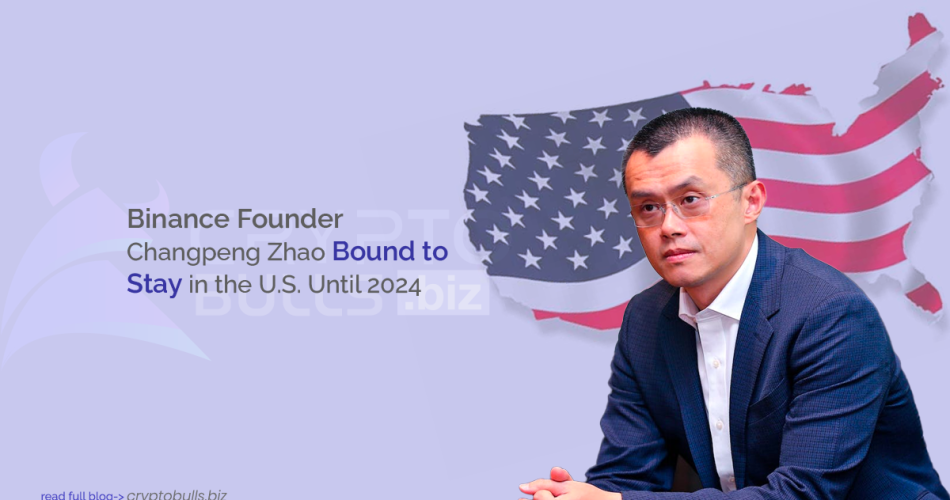Binance Founder Changpeng Zhao Bound to Stay in the U.S. Until 2024
In a significant development in the world of cryptocurrencies, Changpeng Zhao, the founder of Binance, one of the world’s largest cryptocurrency exchanges, is currently embroiled in a legal dispute in the United States. The case has raised eyebrows in the crypto community and has significant implications for the future of Binance. The most notable aspect of this case is that Zhao is required to remain in the United States until February 2024.
Unfolding the Legal Case
The U.S. Securities and Exchange Commission (SEC) and the Commodity Futures Trading Commission (CFTC) have filed lawsuits against Zhao and Binance. The SEC alleges that Binance operated illegally, sold unregistered securities, and mishandled customer assets. Zhao is named as their “controlling person” in the lawsuit. This means that he is considered responsible for the actions of Binance. The CFTC’s suit claims that Binance did not properly register with the regulator. This is a requirement for any company that wants to operate a trading platform for commodities, including cryptocurrencies.
The Court’s Verdict
In a recent court hearing, the SEC requested an inspection of Binance US’s technical infrastructure and other information. This was part of their investigation into the allegations against Binance. However, Federal Magistrate Judge Zia Faruqui denied the request. He advised the SEC to come up with more tailored requests and speak with additional witnesses. This decision is significant because it shows that the court is not simply accepting the SEC’s allegations at face value. Instead, the court is requiring the SEC to provide more specific evidence to support their claims.
Zhao’s Legal Bind
On Dec. 7, Seattle district court Judge Richard Jones ordered Zhao to stay in the U.S. until his Feb. 23, 2024 sentencing date. He faces up to 18 months in prison after pleading guilty to money laundering on Nov. 21 and has agreed not to appeal any potential sentence up to that length. The judge determined there was too much of a flight risk if Zhao was allowed to return to the United Arab Emirates. “The defendant has enormous wealth and property abroad, and no ties to the United States,” Jones wrote, agreeing with earlier arguments from federal prosecutors who said they “would not be able to secure his return” if Zhao decided not to return to the United States. “His family resides in the UAE and it appears that he has favoured status in the UAE. Under these circumstances the Court finds that the defendant has not established by clear and convincing evidence that he is not likely to flee if he returns to the UAE,” Jones added.
Zhao’s Stand
Zhao and Binance have rejected both regulators’ allegations and are seeking to dismiss both lawsuits. Zhao has been released from custody on a $175 million personal recognizance bond. He has promised to appear in court for all future proceedings. His sentencing hearing has been scheduled for Feb. 23, 2024. As part of his release conditions, Zhao must stay in the United States until his sentencing hearing in February 2024. This is a significant development because it means that Zhao will be unable to leave the United States for over a year. This could have significant implications for his ability to manage Binance.
Zhao’s Stay in the U.S.
The requirement for Zhao to stay in the U.S. is a significant part of this case. It is not uncommon for courts to impose travel restrictions on individuals involved in legal proceedings to ensure their presence at future court dates. In this case, the court has required Zhao to stay in the U.S. until his sentencing hearing in February 2024. This requirement is likely due to concerns that Zhao might not return to the U.S. if he were allowed to leave. This extended stay in the U.S. could have significant implications for Zhao personally and professionally. It could affect his ability to manage Binance and could also impact his personal life.
Impact on Binance
The legal case has had a significant impact on Binance. The company’s trading volumes have fallen, and Zhao’s net worth has seen a substantial decrease. This is likely due to the uncertainty surrounding the legal case. Investors and traders may be wary of using Binance until the legal issues are resolved. In response to these challenges, Binance has named Richard Teng, its head of regional markets outside of the United States, as its new CEO. This is a significant development because it shows that Binance is taking steps to ensure its continued operation despite the legal challenges it is facing.
Conclusion
The ongoing legal case involving Changpeng Zhao and Binance is a landmark event in the crypto industry. It underscores the increasing scrutiny that crypto exchanges are facing from regulators. The outcome of this case could have far-reaching implications for the future of Binance and the broader crypto industry. It also highlights the importance of regulatory compliance for companies operating in the crypto space. As the legal proceedings continue, it will be important to monitor developments and understand their potential impact on the crypto industry.


